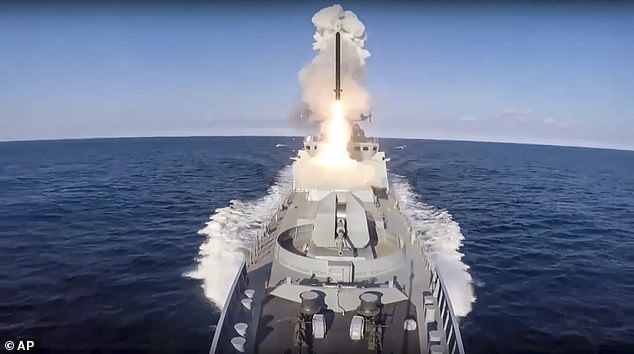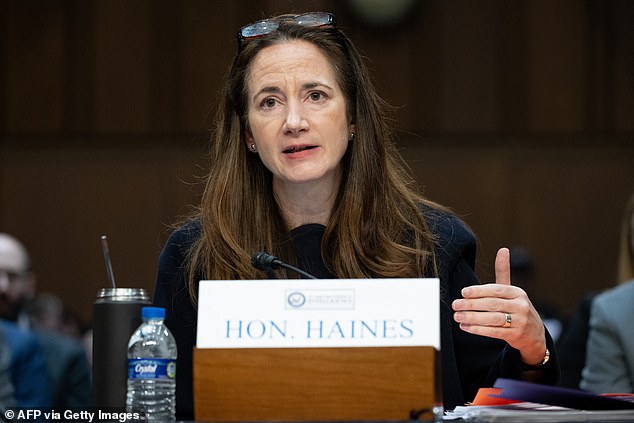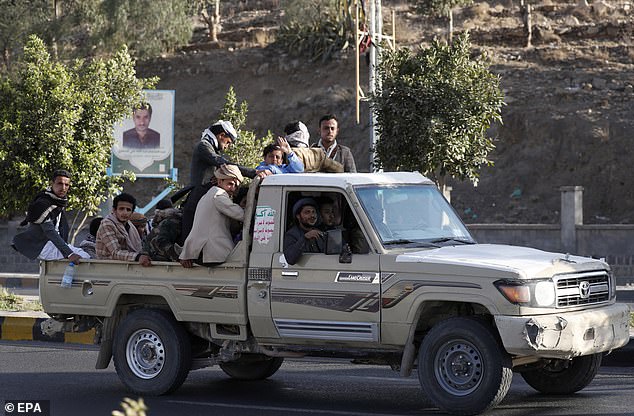- US spy agencies released their annual threat assessment for 2024 on Monday
- It described how regional conflicts fueled global insecurity and fragility
- And it said Iran, China and Russia may all try to influence the 2024 election
<!–
<!–
<!– <!–
<!–
<!–
<!–
US intelligence agencies warned on Monday that it faces threats from an ‘increasingly fragile world order’, as Russia and China jockey for position amid regional conflicts, economic strains and accelerating artificial intelligence.
“An ambitious but anxious China, a confrontational Russia, some regional powers such as Iran, and more capable non-state actors are challenging long-standing rules of the international system as well as US primacy within it,” the agencies said in the 2024 Annual. Threat assessment.
It warns that Russia, Iran and China could act to influence the outcome of the 2024 US election to try to sideline critics or sow confusion.
Beijing has a head start, the report says, with TikTok, which is owned by Chinese company ByteDance.
“China is demonstrating a higher level of sophistication in its influence activity, including experiments with generative AI,” it said.

US intelligence agencies warned on Monday that it faces threats from an ‘increasingly fragile world order’, as Russia and China jockey for position amid regional conflicts, economic strains and accelerating artificial intelligence. Seen here, the Russian frigate of the Black Sea Fleet fires a Caliber cruise missile from the Black Sea
‘TikTok accounts run by a propaganda arm in China allegedly targeted candidates from both political parties during the 2022 US midterm election cycle.’
The video-sharing app, used by around 170 million people, is emerging as a key issue in the 2024 campaign.
President Joe Biden says he will support legislation to ban it, while his likely Republican challenger Donald Trump said he shares national security concerns but the move will only help Facebook, which he continues to criticize for what he sees as its role in his loss in 2020.
But it was identified as just one of the routes that foreign powers could use to undermine US security in the assessment, run by the Office of the Director of National Intelligence.
And it comes at a time of increasing global fragility, says the report.
Avril Haines, the director of national intelligence, appeared before senators to issue a further warning that the conflict between Israel and Hamas in Gaza could spread further uncertainty.
“The crisis in Gaza is a stark example of how regional development has the potential for wider and even global implications,” she said.
Haines also urged lawmakers to approve more military aid to Ukraine, saying it was hard to see how it could keep territory recaptured from Russia without more support from Washington.


Director of National Intelligence Avril Haines testifies before a Senate Select Committee on Intelligence on the ‘annual worldwide threat assessment’ Monday


Houthi supporters in Yemen. They are one of the examples of how the crisis in Gaza has the potential to increase security around the world
The report also outlined how Russia’s strengthened ties with China, Iran and North Korea presented new challenges for the West as it continues to seek confrontation.
Recent reports have suggested that it is looking to take the arms race to space by deploying a nuclear weapon that would destroy satellites by releasing a huge energy wave when detonated.
“Russia continues to train its military space elements and field new anti-satellite weapons to disrupt and degrade US and allied space capabilities,” the report said.
“It is expanding its arsenal of jamming systems, directed energy weapons, in-orbit counterspace capabilities, and ground-based (anti-satellite) missiles designed to target U.S. and allied satellites.”
